By David Pan · Monday, March 24, 2025 Telos 210 (Spring 2025): Rethinking State Power is now available for purchase in our store. Individual subscriptions to Telos are also available in both print and online formats.
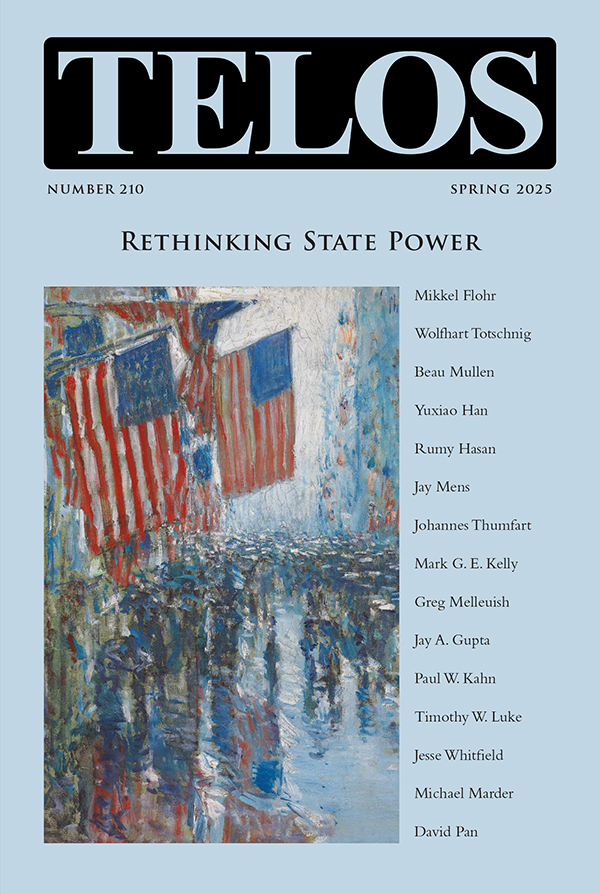 Frustrating the hopes of cosmopolitans and globalists, state power is back. Rather than imagining a replacement of sovereignty with law, political debates now revolve around the particular forms that state sovereignty might take. Even Europe, long seeing itself as the place from which a new international legal order might expand its reach, is reinvesting in military power to protect its sovereignty from the threats posed by Russia, China, and, in some ways, the United States. Yet this realization about the continuing centrality of the state does not mean an abandonment of the moral imperatives and prejudices of the people. On the contrary, state power is being recognized as the instrument through which the people can exercise their will, even as the state places constraints on popular sovereignty. The essays in this issue of Telos consider the ways in which state power interacts with popular attitudes and social institutions in order to establish the basis for sovereignty and law. Frustrating the hopes of cosmopolitans and globalists, state power is back. Rather than imagining a replacement of sovereignty with law, political debates now revolve around the particular forms that state sovereignty might take. Even Europe, long seeing itself as the place from which a new international legal order might expand its reach, is reinvesting in military power to protect its sovereignty from the threats posed by Russia, China, and, in some ways, the United States. Yet this realization about the continuing centrality of the state does not mean an abandonment of the moral imperatives and prejudices of the people. On the contrary, state power is being recognized as the instrument through which the people can exercise their will, even as the state places constraints on popular sovereignty. The essays in this issue of Telos consider the ways in which state power interacts with popular attitudes and social institutions in order to establish the basis for sovereignty and law.
Continue reading →
By David Pan · Monday, January 6, 2025 Telos 209 (Winter 2024): Democracy Today? is now available for purchase in our store. Individual subscriptions to Telos are also available in both print and online formats.
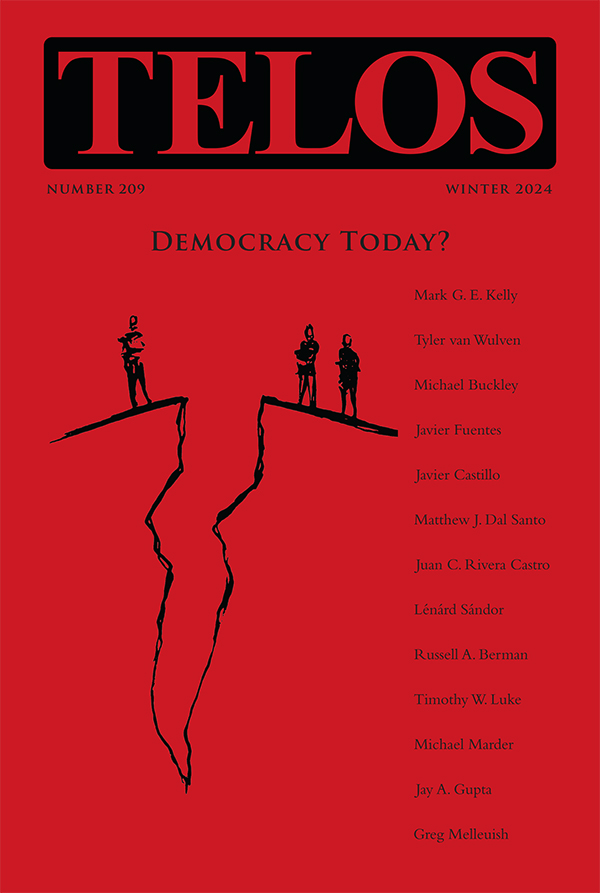 Since the supposed triumph of liberal democracy with the end of the Cold War, democracy seems now to be in retreat. The hung parliaments in France and Germany, reminiscent of the divides of Germany’s Weimar Republic; the just-in-time reversal of the declaration of martial law in South Korea; the increasing authoritarianism of China, Iran, and Russia; and the deterioration of democratic norms in the United States are all indications that the liberal democratic end of history was a chimera. Since the supposed triumph of liberal democracy with the end of the Cold War, democracy seems now to be in retreat. The hung parliaments in France and Germany, reminiscent of the divides of Germany’s Weimar Republic; the just-in-time reversal of the declaration of martial law in South Korea; the increasing authoritarianism of China, Iran, and Russia; and the deterioration of democratic norms in the United States are all indications that the liberal democratic end of history was a chimera.
What is the situation of democracy today? Are the present problems simply growing pains in the inevitable march of history, or are there fundamental limitations of this political form? Is democracy a stable form of government or a delicate balancing act that will always be at risk of deteriorating and being replaced by some form of authoritarianism?
These current indications of the precarity of democracy also coincide, however, with an intense concern for its future. Never has there been such a focus on democracy as a political goal. During the Cold War, the United States, more concerned about promoting capitalism than defending democracy, supported capitalist authoritarianism in places such as Chile, South Korea, and Taiwan. But as it turned out, capitalism did not really need such political backing. In the Cold War between capitalism and communism, the latter lost based on its inability to produce economic growth. Insofar as communism’s undermining of private property and market mechanisms proved to be economically catastrophic, even nominally communist governments in China and Vietnam have since voluntarily embraced capitalist economic policies. Aside from U.S. college campuses, the only diehard Marxists left are in Cuba, North Korea, and Venezuela, all of whose governments are presiding over the immiseration of their peoples.
While it was the Soviet Union, and not capitalism, that collapsed under the weight of its own contradictions, the general recognition of these contradictions meant that communism could only maintain itself by using repressive methods. Communism has been one of the surest ways of moving toward and cementing authoritarianism and totalitarianism. By contrast, capitalist authoritarianism has sometimes led to democratic reforms, and we can point again to Chile, South Korea, and Taiwan, but also to the countries of Eastern Europe, as successful transitioners to democracy within a capitalist framework. Unfortunately, while communism might correlate strongly with authoritarianism, the link between capitalism and democracy does not seem to be so tight.
Continue reading →
By David Pan · Friday, October 18, 2024 Telos 208 (Fall 2024): Carl Schmitt and the Crisis of Liberal Democracy is now available for purchase in our store. Individual subscriptions to Telos are also available in both print and online formats.
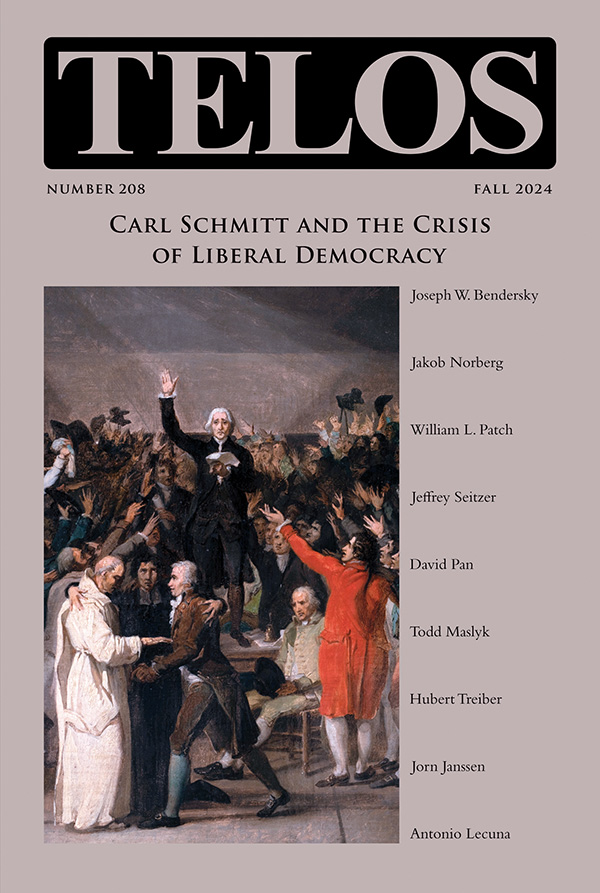 It hardly needs mentioning that liberal democracy is facing a number of threats today, both internal and external. Even if the political parties in the United States cannot agree on the main source of the threats, they both believe that democracy is in danger. Democrats point to the January 6 Capitol riot and Trump’s role in it as examples of the way in which liberal democratic procedures are being directly attacked. Republicans point to the Democratic-backed court cases against Trump as well as the FBI’s favoritism toward Democrats in their public announcements before elections as evidence that the legal system and the administrative state are being used to shut out political opponents. Both parties point to violations of free speech rights at college campuses, yet they also both seek to establish limits to those rights in defense of liberal democratic values. It hardly needs mentioning that liberal democracy is facing a number of threats today, both internal and external. Even if the political parties in the United States cannot agree on the main source of the threats, they both believe that democracy is in danger. Democrats point to the January 6 Capitol riot and Trump’s role in it as examples of the way in which liberal democratic procedures are being directly attacked. Republicans point to the Democratic-backed court cases against Trump as well as the FBI’s favoritism toward Democrats in their public announcements before elections as evidence that the legal system and the administrative state are being used to shut out political opponents. Both parties point to violations of free speech rights at college campuses, yet they also both seek to establish limits to those rights in defense of liberal democratic values.
Meanwhile, authoritarian governments in places such as China, Russia, Iran, and North Korea have becoming increasingly aggressive in opposing liberal democracies as threats to their own legitimacy. In doing so, they have attempted to provide theoretical justifications for their authoritarian rule that are based in anti-Western and anti-colonial discourses that align with critiques of the West advanced by left-leaning academics in liberal democracies.
Because they are based on freedom of expression and freedom of conscience, liberal democracies must allow open public spheres whose dynamics could take unforeseen directions that end up undermining the cultural and procedural foundations of liberal democratic governance. While the American Revolution provides the best example of the success of liberal democracy, the French Revolution and the Weimar Republic demonstrate spectacular failures. Outside of the West, the contrast between Taiwan and China and between Indonesian democracy and the Iranian Revolution indicate that we can find the same contrasts between failure and success in East Asia and in the Islamic world.
Continue reading →
By David Pan · Friday, July 12, 2024 Telos 207 (Summer 2024): Politics and the University is now available for purchase in our store. Individual subscriptions to Telos are also available in both print and online formats.
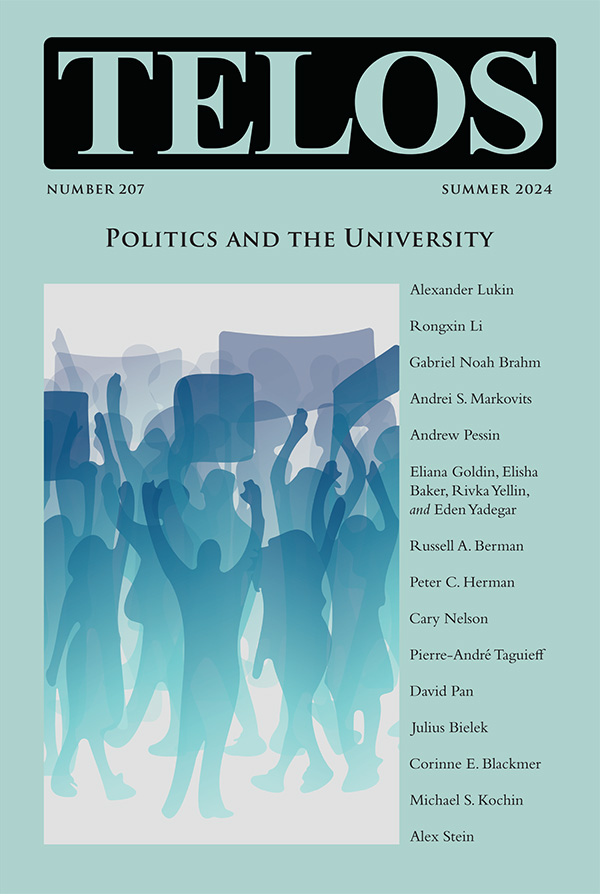 There is a fundamental arbitrariness about the work that is done at colleges and universities, which stems from the relationship between academic work and the political parameters of this work. The key issue is that the most basic aspect of our humanity involves having a sense of right and wrong. This sense of values sets the framework for all our other thoughts, actions, and decisions, providing direction and meaning for our lives. There is a fundamental arbitrariness about the work that is done at colleges and universities, which stems from the relationship between academic work and the political parameters of this work. The key issue is that the most basic aspect of our humanity involves having a sense of right and wrong. This sense of values sets the framework for all our other thoughts, actions, and decisions, providing direction and meaning for our lives.
The feeling that we are doing the right thing can motivate us to great achievements, and the loss of that feeling can lead us into inescapable despair. At the same time, when we perceive that others are doing wrong, we have a feeling of indignation at such injustice and seek to redress it. We will also judge the wrong doer in the same harsh light that we might use against ourselves when we fail to live up to our own ideals. Consequently, our sense of values will color all our perceptions and determine our decisions and judgments.
Continue reading →
By David Pan · Wednesday, April 24, 2024 The following essay is part of a special series of responses to recent events centered, for now, at Columbia University, and extending beyond its confines to include the wider array of societal problems that the disorder there symptomatizes. For details, see Gabriel Noah Brahm, “From Palestine Avenue to Morningside Heights.”—Gabriel Noah Brahm, Director of the Telos-Paul Piccone Institute’s Israel initiative  Columbia University president Nemat Shafik’s recent testimony to Congress indicates an important shift in our conception of academic freedom. While affirming the legal principle of free speech, she clearly accepted limits on academic freedom by stating that calls for genocide have no place at the university. Since at least one issue would disqualify someone from participating in Columbia’s educational project, she opens up the question of the limits of academic freedom and the duty of a university to enforce such limits through decisions on hiring and dismissal of faculty as well as suspension of students. While the American Association of University Professors seeks to criticize such restrictions on academic freedom, its 1940 statement on academic freedom stipulates that “[i]nstitutions of higher education are conducted for the common good and not to further the interest of either the individual teacher or the institution as a whole.” The congressional hearings have demonstrated that the common good may require restrictions on academic freedom, and such restrictions indeed are already part of the way universities see their mission. Columbia University president Nemat Shafik’s recent testimony to Congress indicates an important shift in our conception of academic freedom. While affirming the legal principle of free speech, she clearly accepted limits on academic freedom by stating that calls for genocide have no place at the university. Since at least one issue would disqualify someone from participating in Columbia’s educational project, she opens up the question of the limits of academic freedom and the duty of a university to enforce such limits through decisions on hiring and dismissal of faculty as well as suspension of students. While the American Association of University Professors seeks to criticize such restrictions on academic freedom, its 1940 statement on academic freedom stipulates that “[i]nstitutions of higher education are conducted for the common good and not to further the interest of either the individual teacher or the institution as a whole.” The congressional hearings have demonstrated that the common good may require restrictions on academic freedom, and such restrictions indeed are already part of the way universities see their mission.
Continue reading →
By David Pan · Friday, April 5, 2024 Telos 206 (Spring 2024): The Intuitive and the Conceptual is now available for purchase in our store. Individual subscriptions to Telos are also available in both print and online formats.
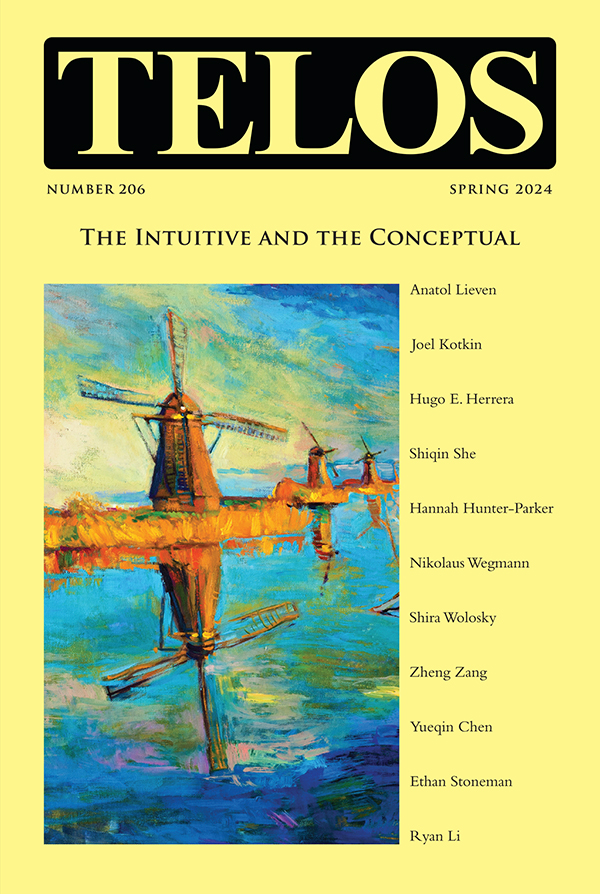 We often have the experience of intuiting something without being able to precisely define what that intuition is. Sometimes this intuition leads to a more well-defined insight, and sometimes it might lead to some kind of action, even in the absence of clear conceptual definitions. Yet it is difficult to ascertain what kind of knowledge or awareness such intuitions consist of. What is an intuition as opposed to a defined concept of something? How seriously should we take such intuitions? Are they something separate and qualitatively different than concepts? Are they just fuzzy concepts? Do they really exist at all? These are crucial questions because they lead to conclusions about the status of concepts themselves. If the alternative to clear concepts is nothing at all, then the sociopolitical corollary would be that the alternative to conceptual knowledge and the holders of such knowledge would also be nothing at all. By contrast, if intuitions are separate from concepts and real, then expert knowledge might possibly have some deficiencies in comparison with intuitions. The essays in this issue of Telos explore in one way or another this question of the status of conceptual knowledge as opposed to intuitive awareness. We often have the experience of intuiting something without being able to precisely define what that intuition is. Sometimes this intuition leads to a more well-defined insight, and sometimes it might lead to some kind of action, even in the absence of clear conceptual definitions. Yet it is difficult to ascertain what kind of knowledge or awareness such intuitions consist of. What is an intuition as opposed to a defined concept of something? How seriously should we take such intuitions? Are they something separate and qualitatively different than concepts? Are they just fuzzy concepts? Do they really exist at all? These are crucial questions because they lead to conclusions about the status of concepts themselves. If the alternative to clear concepts is nothing at all, then the sociopolitical corollary would be that the alternative to conceptual knowledge and the holders of such knowledge would also be nothing at all. By contrast, if intuitions are separate from concepts and real, then expert knowledge might possibly have some deficiencies in comparison with intuitions. The essays in this issue of Telos explore in one way or another this question of the status of conceptual knowledge as opposed to intuitive awareness.
Continue reading →
|
|
 Frustrating the hopes of cosmopolitans and globalists, state power is back. Rather than imagining a replacement of sovereignty with law, political debates now revolve around the particular forms that state sovereignty might take. Even Europe, long seeing itself as the place from which a new international legal order might expand its reach, is reinvesting in military power to protect its sovereignty from the threats posed by Russia, China, and, in some ways, the United States. Yet this realization about the continuing centrality of the state does not mean an abandonment of the moral imperatives and prejudices of the people. On the contrary, state power is being recognized as the instrument through which the people can exercise their will, even as the state places constraints on popular sovereignty. The essays in this issue of Telos consider the ways in which state power interacts with popular attitudes and social institutions in order to establish the basis for sovereignty and law.
Frustrating the hopes of cosmopolitans and globalists, state power is back. Rather than imagining a replacement of sovereignty with law, political debates now revolve around the particular forms that state sovereignty might take. Even Europe, long seeing itself as the place from which a new international legal order might expand its reach, is reinvesting in military power to protect its sovereignty from the threats posed by Russia, China, and, in some ways, the United States. Yet this realization about the continuing centrality of the state does not mean an abandonment of the moral imperatives and prejudices of the people. On the contrary, state power is being recognized as the instrument through which the people can exercise their will, even as the state places constraints on popular sovereignty. The essays in this issue of Telos consider the ways in which state power interacts with popular attitudes and social institutions in order to establish the basis for sovereignty and law. 






